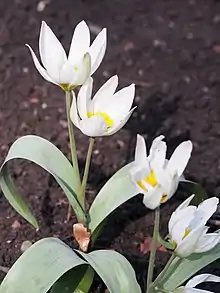| Tulipa biflora | |
|---|---|
 | |
| Scientific classification | |
| Kingdom: | Plantae |
| Clade: | Tracheophytes |
| Clade: | Angiosperms |
| Clade: | Monocots |
| Order: | Liliales |
| Family: | Liliaceae |
| Subfamily: | Lilioideae |
| Tribe: | Lilieae |
| Genus: | Tulipa |
| Species: | T. biflora |
| Binomial name | |
| Tulipa biflora | |
| Synonyms[2][3] | |
|
List
| |
Tulipa biflora, the two-flowered tulip, is a species of tulip, native to the former Yugoslavia, Crimea, Anatolia, the Caucasus, southern Russia, Egypt, the Middle East, Central Asia, Iran, Pakistan, Afghanistan and Xinjiang in China. It has many synonyms, including Tulipa polychroma.[2][4]
It can be found on screes, rocky slopes,[5] grassy slopes and deserts.[6][7] It can be found in the salt deserts in the basin of the Wolga and it can often found with the small yellow tulip, Tulipa sylvestris.[8]
Cultivated, it has two, occasionally one or three, flowers borne on a single stalk.[9] It has stems that can grow up to 10cm tall,[5] with 2 (sometimes more) grey-green leaves.[10] They are lanceolate (lance-like in shape.[8] It blooms between late winter to spring, and the flowers are 2-3.5cm long. They are white with a yellow centre, the tepal (smaller petal) have greenish-grey backs.[10] The flowers are fragrant.[8]
Most parts of plant are poisonous if they are ingested.[11]
Taxonomy
It was found in the Caucasus, and then published by Peter Simon Pallas in 'Reise durch Verschiedene Provinzen des Russischen Reichs.' (Reise Russ. Reich. printed in St. Petersburg), Vol.3 on page 727 in 1776.[12][3][13]
References
- ↑ Reise Russ. Reich. 3: 727 (1776)
- 1 2 "Tulipa biflora Pall". Plants of the World Online. Board of Trustees of the Royal Botanic Gardens, Kew. 2017. Retrieved 27 August 2020.
- 1 2 "Tulipa biflora Pall. is an accepted name". theplantlist.org. Retrieved 14 April 2020.
- ↑ Christenhusz, Maarten J. M.; Govaerts, Rafaël; David, John C.; Hall, Tony; Borland, Katherine; Roberts, Penelope S.; Tuomisto, Anne; Buerki, Sven; Chase, Mark W.; Fay, Michael F. (2013). "Tiptoe through the tulips - cultural history, molecular phylogenetics and classification of Tulipa (Liliaceae)". Botanical Journal of the Linnean Society. 172 (3): 280–328. doi:10.1111/boj.12061.
- 1 2 "Pacific Bulb Society | Tulipa Species One". www.pacificbulbsociety.org. Retrieved 14 April 2020.
- ↑ "FOC Vol. 24 Page 125". efloras.org (Flora of China). Retrieved 14 April 2020.
- ↑ "Two-Flowered Tulip : Protected". www.wildflowers.co.il. Retrieved 15 April 2020.
- 1 2 3 John Marius Wilson (editor) The Rural Cyclopedia: Or a General Dictionary of Agriculture, and Arts, Sciences, Instruments, and Practice, necessary to the farmer, stockfarmer, gardener, forester, landsteward, farrier, &c. Volume 4 (1849), p. 498, at Google Books
- ↑ "Tulipa biflora (15) two-flowered tulip". The Royal Horticultural Society. Retrieved 27 August 2020.
- 1 2 "Tulipa biflora". Alpine Garden Society. Retrieved 14 April 2020.
- ↑ "PlantFiles: Species Tulip, Botanical Tulip, Two-Flowered Tulip, Wild Tulip". Dave's Garden. Retrieved 15 April 2020.
- ↑ "Tulipa biflora | International Plant Names Index". www.ipni.org. Retrieved 14 April 2020.
- ↑ "Taxon: Tulipa biflora Pall". npgsweb.ars-grin.gov. Retrieved 14 April 2020.
Other Sources
- Aldén, B., S. Ryman, & M. Hjertson. 2012. Svensk Kulturväxtdatabas, SKUD (Swedish Cultivated and Utility Plants Database; online resource) URL: www.skud.info
- Davis, P. H., ed. 1965-1988. Flora of Turkey and the east Aegean islands.
- Komarov, V. L. et al., eds. 1934-1964. Flora SSSR.
- Raamsdonk, L. W. D. van & T. de Vries. 1992. Biosystematic studies in Tulipa sect. Eriostemones (Liliaceae). Pl. Syst. Evol. 179:37. Note: mentions
- Rechinger, K. H., ed. 1963-. Flora iranica.
- Skvortsov, A. K., ed. 2006. Flora of the Lower Volga region 1:366.
- Tutin, T. G. et al., eds. 1964-1980. Flora europaea.
- Walters, S. M. et al., eds. 1986-2000. European garden flora.